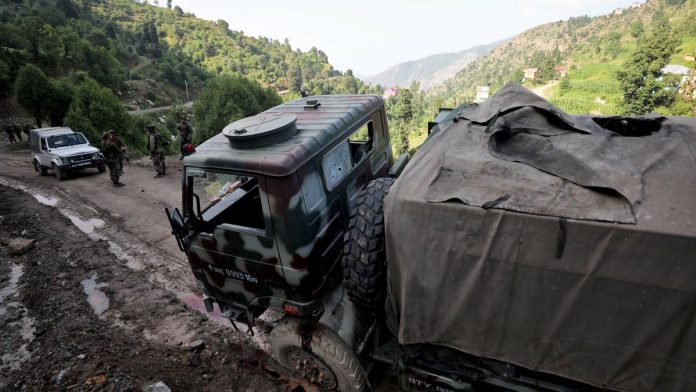Another terrorist attack in Jammu, which claimed the lives of five brave soldiers and left five others injured, marks yet another tragic episode in the region’s long battle against terrorism. The assault on the Army truck in the hilly village of Badnota, Kathua district, exemplifies the persistent and evolving threat posed by terrorist groups. This incident underscores the urgent need for a comprehensive and unified approach to combating terrorism and strengthening security measures. The matter is quite serious, with terrorists now frequently targeting security forces, civilians, and infrastructure. The recent attack in Kathua is the sixth in the region within a month, highlighting a worrying trend of increased militant activity. The terrorists’ strategy of attacking from elevated positions, using grenades and automatic weapons, indicates a high level of planning and sophistication. Such tactics not only cause significant casualties but also disrupt the sense of security among the local population.
The bravery and sacrifice of our soldiers cannot be overstated. Five army men who lost their lives in the recent attack exemplify the courage and dedication of our armed forces. Their sacrifice serves as a stark reminder of the dangers faced by those who protect our nation. The injured soldiers continued to fight on, demonstrating their resilience and commitment. The entire nation pays heartfelt homage to the soldiers who sacrificed their lives. Despite claims of peace and terrorism being on the verge of ending, there are persistent threats and tactical challenges. The terrorists involved in the Kathua attack believed to be foreign militants associated with LeT or JeM, managed to escape, indicating the complexity of the threat. These groups are well-equipped and receive substantial support from across the border. The involvement of local guides familiar with the terrain further complicates counter-terrorism efforts. The dense forests and challenging weather conditions in the region, including heavy rains and fog, hinder search and rescue operations, providing cover for the terrorists to evade capture.
Repeated terror attacks on army vehicles reveal several critical issues. Despite the claims that infiltration routes have been sealed, terrorists continue to infiltrate from across the border with alarming ease. Simultaneously, local police have failed to gather substantial intelligence to preempt and thwart these attacks. The inability to track over ground workers has provided significant support to terrorists. These OGWs are well-versed in infiltration routes, offer shelter to terrorists, and conduct joint reconnaissance for future attacks. They also have detailed knowledge of army movements and local road conditions. The local population consistently informs authorities about terrorist movements in their areas, but the police and other agencies have not acted proactively on this information. Each piece of information from locals is invaluable and must be taken seriously. In terms of security, there is a noticeable lack of area dominance in regions where recent attacks have occurred. Security forces need to re-evaluate and revise their strategies to counter these terrorist tactics. The army must also recognise that canopy roof trucks offer inadequate protection for soldiers and should make necessary modifications as soon as possible.
A particularly concerning aspect of these attacks is that terrorists are able to escape the scene and remain untraceable. All security agencies need to collaborate, devise a comprehensive counter-terror plan, and implement it effectively. Only through a proactive approach can terrorism be tackled effectively. The Government must take measures to address repeated intelligence failures and fix responsibility. Recently, terrorists have been able to strike at will in various districts across the entire UT, indicating their ability to move freely across the region. Security agencies must focus on this issue, paying special attention to railway stations, particularly those far from urban centres with easy access to highways and fruit trucks. Foolproof security arrangements are essential to monitor the movement of various terror groups, with the local police playing a crucial role in this effort.
The attack in Kathua is part of a broader pattern of terrorism in Jammu and Kashmir over the past three years. Since October 2021, 43 soldiers have been martyred in various incidents, reflecting the persistent and evolving nature of the threat. Major incidents, such as the prolonged gun battles in Chamrer and Bhatta Durrian forests and the devastating attacks in Poonch and Rajouri, highlight the need for adaptive strategies. Effective intelligence gathering and community support are critical to combating terrorism. Strengthening the intelligence network and fostering trust between security forces and the local population are essential to identifying and neutralising threats before they materialize. The role of OGWs, who provide logistical support to terrorists, must be curtailed through vigilant monitoring and community cooperation. Learning from past encounters, it is crucial to address the gaps in intelligence, coordination, and resource allocation that terrorists exploit.
The resilience of the people of Jammu and Kashmir is commendable. But authorities have to look at the way forward. It’s time to invest in advanced surveillance technology, including drones and satellite imagery, that can provide real-time data on terrorist movements. Strengthening human intelligence networks through community partnerships is equally vital. Strengthening local VDGs is the most prominent bet. Providing them with adequate training and sophisticated weapons will be a promising initiative. Authorities must understand the importance of VDGs and their past role in the eradication of terrorism in remote areas. On the other hand, building trust between security forces and local communities through regular interactions, joint initiatives, and transparent communication can help identify and neutralise threats early. Community policing and local defence groups can play a supportive role. Certain harsh measures have to be put in place. Authorities have enough information to act against these acts of treason. The threat of terrorism remains persistent, and denial will not help in countering it. The fight against terrorism is an ongoing process that requires a proactive approach. While knee-jerk reactions may yield instant results, they are not an effective long-term solution for tackling insurgency. Security agencies must revamp their strategies to tackle the situation.
Trending Now
E-Paper


